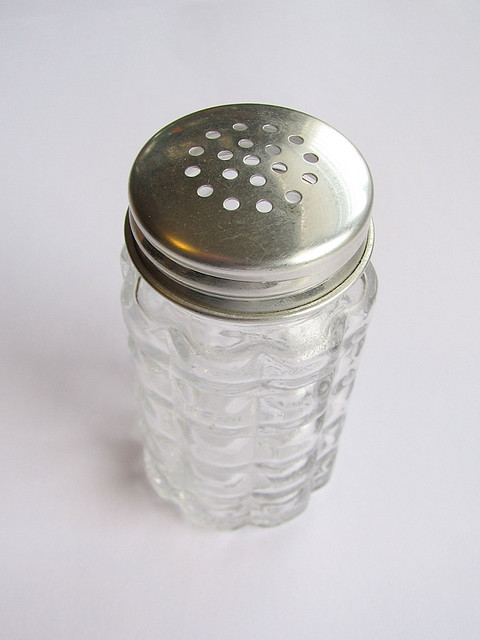Community Radio for Northern Colorado, part of NPR, recently weighed in about the havoc that eating salt wreaks on our health. I’ve taken the liberty to reprint the report in its entirety because I think its message, which echoes mine, is so important. If you have loved ones who still aren’t convinced about how harmful eating salt can be, please forward this blog post to them. Maybe it will help get the message across.

Credit Lain Watson / Flickr - Creative Commons
- Listen [03:23]
Not many people would pour a teaspoon of salt over their plates at dinner. Yet with so much hidden salt in processed foods, that’s what most Coloradans are eating.
And it’s proving to be a killer.
Americans are consuming so much salt – much of it unknowingly – that it has helped set blood pressure soaring for one in three adults.
Long-term high blood pressure silently inflames or hardens arteries, eventually damaging hearts. Consistent high blood pressure also is also a factor in strokes, which occur when either blockages or ruptures interrupt the blood supply to the brain.
“The high-sodium food is causing a lot of high blood pressure and stroke, and it’s killing people,” said Debbie Lathrop, a registered nurse at Exempla Lutheran Hospital in Wheat Ridge. Sodium is the name for salt as it is listed on food labels.
Fifteen years ago, potentially fatal damage to hearts occurred mostly in older people, Lathrop said. “It’s not an old people’s disease anymore. People in their 30s are having heart attacks and heart failure,” because they have risk factors of extra weight, inactivity and unhealthy diet, she said.

Credit Lenore Edman / Flickr - Creative Commons
One of those high-salt meals can be much more immediately dangerous to patients who’ve just had an incident of heart failure. Hospitals now track such departing patients to make sure they don’t return within weeks. And, many nurses tell patients to check the salt in every meal. At Lutheran, tracking heart failure patients to prevent this is Lathrop’s job.
High blood pressure, consistently higher than 120/80, can weaken the heart in the first place, Lathrop said. But for people who’ve just survived heart failure, the heart is already weakened, and salt causes the body to act like a sponge and retain sodium and water, Lathrop said. So one high-salt meal can cause swelling and raise blood pressure. Dizzy and miserable, the patients end up back in the hospital and sometimes die, Lathrop said.
A normal amount of salt is 2,000 mg a day, or about one teaspoon, Lathrop said. Many Americans are eating 3,000 to 4,000 mg day. Where a single meal should average about 600 mg maximum, many meals are well over 1,000 or 2,000 mg.
Half the population should consume no more than 1,500 mg a day. That’s everyone with high blood pressure, middle-aged or older, or African-Americans, who are often more susceptible to heart disease.
So what are these dangerously high-salt foods?
“The chances are that almost any restaurant you go to, you will easily go over 2,000 mg,” Lathrop said.
Store shelves are also loaded with high sodium foods. Campbell’s Broccoli Cheese Condensed soup contains 820 mg in a 1 cup serving; but many people eat the whole can of 2.5 servings and get 2,050 mg in one bowl. Chicken fingers marketed for kids often measure well over the daily 1,200 mg maximum for a child, according to the center. Fast-food pancakes and syrup are high in salt. Low-calorie and organic foods often aren’t any better when it comes to salt, Colorado Public News has found.
The Center for Science in the Public Interest has termed salt, “The Forgotten Killer,” and the Food and Drug Administration is considering regulating its use in food. Each year, 150,000 lives could be saved, along with $28 billion in health care costs, the center said.
Some in the food industry are fighting back, saying salt makes food taste better, and consumers like it that way. ConAgra, which makes Healthy Choice and Chef Boyardee, once said that simply eating less food would be better than eating less salt. But now, the food giant has promised to cut 20 percent of the salt out of its foods by 2015. “We’re halfway there, said Mark Andon, vice president of nutrition.
But some foods need a lot more than 20 percent of the salt removed to fall within the recommended guidelines.
“Things that you wouldn’t think were that salty are just loaded with salt,” said Colorado resident Joe Lederhos, who survived heart failure and was exercising recently at Lutheran Hospital. “Marinara sauce. And clam chowder, which I love.”
To keep patients from overdoing the salt, Lutheran and other hospitals are calling them at home to check for swelling, trouble breathing and abrupt water weight gain from salt, such as three pounds in 24 hours. Such signs trigger a call to the doctor and perhaps medications to reduce the symptoms and prevent re-hospitalization, Lathrop said.
Extra salt causes the body to retain fluids, thus increasing the volume of blood. “The heart has to work extra hard to squeeze that blood through blood vessels,” and that’s what strains the heart and causes blood pressure to rise, Lathrop explained.
Nationally, 24.7 percent of heart failure patients return to the hospital within 30 days, a dangerous sign for them and expensive for the health care system. Last year, Lutheran had a 20.6 percent readmission rate for heart failure, among the best in the country. It says it has cut that rate to 15 percent now with Lathrop’s follow up care.
In Colorado, 19 hospitals face small cuts in their Medicare payments next year for having high readmission rates for heart failure, heart attack and pneumonia. That costs taxpayers $17.5 billion a year.
Do all patients listen? Lathrop hesitated, choosing her words. “That could be better,” she said.
Carol McKinley contributed to this story.

0 Comments